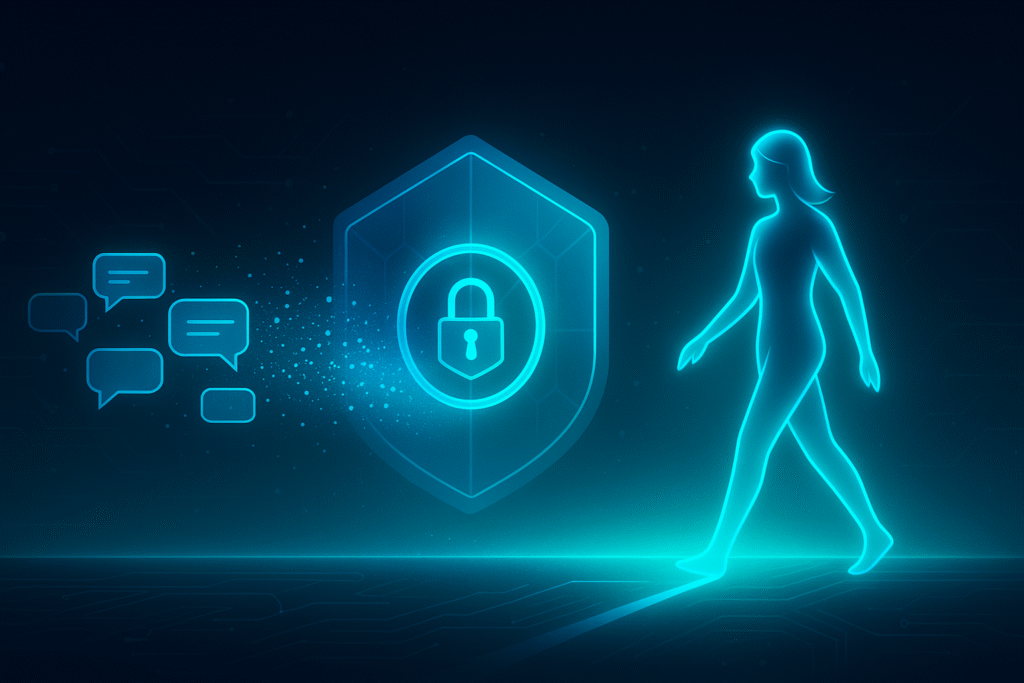Anthropic’s Claude can now end harmful chats—for your safety and its own.

Mobile-first
- What’s new: Claude Opus 4 & 4.1 can now terminate a conversation—as a last resort—when a user keeps pushing for dangerous or abusive content.
- Why it’s important Along with traditional user safety, Anthropic frames this as part of research into “model welfare,” which is a precautionary stance regarding a model’s potential “distress.”
- How they differ: Gemini uses safety filters and warnings, while ChatGPT primarily rejects and enforces policy; neither is presented as terminating the thread for the benefit of the model.
The News in Simple Terms
In Claude Opus 4 and 4.1, Anthropic has activated a conversation-ending feature, but only in “rare, extreme cases”—for example, when there have been several attempts to elicit instructions for mass violence or sexual content involving minors, followed by numerous rejections and redirections. Although that specific thread is closed when Claude ends the chat, you can still begin a new one or branch from previous messages.
The same scope and boundaries are echoed by independent coverage, such as the fact that Claude won’t terminate a conversation if it notices impending harm to oneself or others; in those situations, Anthropic has collaborated with Throughline to develop crisis-appropriate responses.
How Does a Hard Stop Happen?
Continued efforts to request:
- Content that is sexually explicit and involves children
- Information that permits widespread terrorism or acts of violence
- Additional severe, violent behaviors following several rejections
Even in contentious or heated debates, according to Anthropic, these are edge cases that ordinary users will never run into.
The True Reasons Behind Anthropic’s Actions
- A warning regarding “model welfare.”
In order to investigate whether and when AI systems might merit moral consideration, Anthropic has started a formal program. It looks at indicators of “distress” and low-cost solutions, such as letting a model leave damaging interactions. That line of research is the direct source of this feature. - observed behaviors during the testing process.
Strong aversion to harm and a propensity to terminate risky interactions when allowed were discovered in Claude Opus 4 pre-deployment studies, resulting in the creation of a last-resort exit. - Unambiguous product posture in the face of industry events.
With competing chatbots coming under fire from the public for offensive or provocative content, a clear, auditable “end chat” path denotes a safety-first identity. - Rules and regulations.
The industry has come together to declare that frontier AI carries non-trivial risks; in extreme situations, cutting off a conversation is a tangible, legally binding control.
How It Differs From ChatGPT & Gemini (No tiny tables—just the facts)
- Claude (Anthropic):
Action: Can completely stop a discussion in severe, ongoing instances of harm—framed as examining model welfare and safeguarding users. - OpenAI’s ChatGPT:
Action: Public policy documents place more emphasis on user safety and legality than “ending the welfare model.” They politely decline and enforce usage policies against harmful requests. - Gemini (Google):
Action: Uses safety filters and configurable settings; warns or blocks content, but the focus remains user-facing safety controls, not thread termination for the model’s welfare.
Mobile-Friendly Takeaways for Creators & Teams
- UX impact: Rather than continuous refusal loops, expect the occasional thread-closure banner, which is easier to explain to auditors and cleaner for moderation logs.
- Clarity of policy: “End chat” is a deterministic safety outcome that your safety team and trust can record, which is preferable to mushy multi-turn rejections.
- Refraining from anthropomorphism: According to The Guardian, this could intensify public discussion regarding AI sentience; teams should communicate cautiously to prevent users from giving tools too many emotions.
Famous Statements From Tech Giants (context for the moment)
“AI is arguably the most significant project humanity has ever undertaken—more significant than fire or electricity.” — Sundar Pichai
“The fact that we are a little afraid should make people happy.” — Sam Altman (on AI risks)
“AI risk must be treated as seriously as the climate crisis.” — Demis Hassabis
“With artificial intelligence we are summoning the demon.” — Elon Musk
“It’s on an exponential curve, and we’re on the steep part of that curve right now.” — Dario Amodei
These quotes sketch the tension: move fast, be hopeful—but build brakes you can actually pull.
Editorial Note: The Poetry of a Hard Stop
When a chat turns corrosive, Claude doesn’t argue through the smoke; it opens a window and walks out. It’s not a tantrum. It’s a guardrail—an admission that some conversations are roads to nowhere, and that ending can be wiser than answering.
What to Watch Next
- False positives: Over-eager shutdowns frustrate users; robust appeal & “edit-and-retry” affordances matter.
- Consistency across platforms: Expect pressure on other labs to justify why they don’t end threads—or to prove their warnings are just as effective.
- Norm-setting: As more labs publish safety playbooks, “end chat on X/Y/Z” could become a standard operating control in AI governance.
Conclusion
Anthropic’s move reframes safety from “protect the user from the model” to “protect the interaction itself”—including a precautionary nod to model welfare. Whether you view that as prudent ethics or clever product positioning, one thing is clear: in edge-case conversations where words can cause real-world harm, the cleanest outcome is sometimes closure. And in an industry sprinting toward ever-more-capable systems, building the right to walk away may be the most human guardrail of all.
Disclaimer
- Info current as of Aug 19, 2025; features may change—check official docs.
- Independent analysis; no affiliation with Anthropic, OpenAI, or Google; trademarks belong to their owners.
- Quotes are from public remarks, lightly edited for clarity.
- Not legal, medical, security, or investment advice.
- Images are AI-generated and illustrative—no endorsement implied.
- If you or someone is in crisis, contact local emergency services or a helpline.